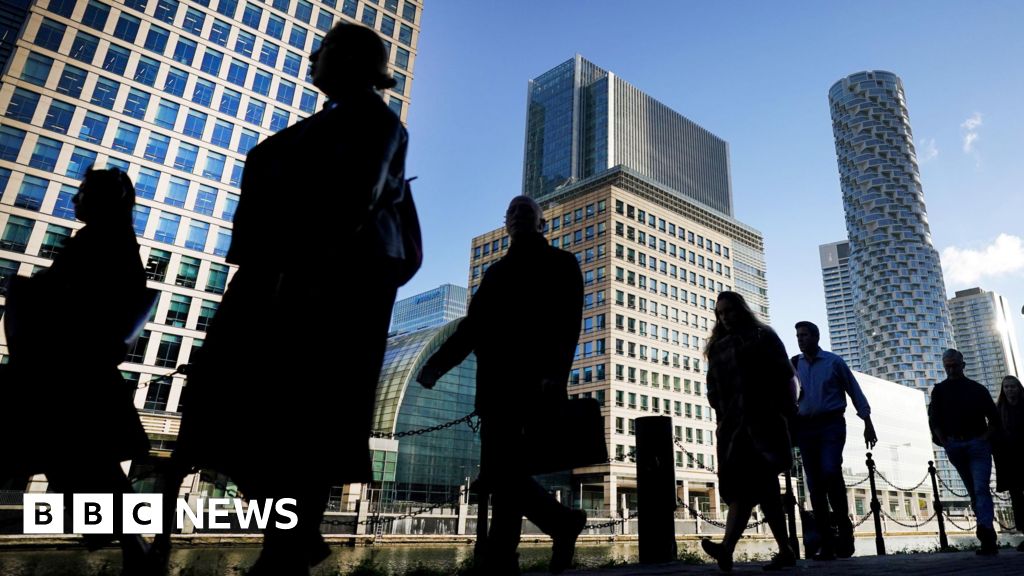ARTICLE AD BOX
Image source, Getty Images
Image caption, The fund says there is a growing "vaccine divide" between rich and poor nationsThe economic recovery has weakened in most rich nations due to the impact of the Delta variant of coronavirus, the International Monetary Fund (IMF) says.
The fund cut its 2021 growth forecasts for advanced economies - in particular the US, Japan and Germany - blaming continued health risks, supply chain issues and high inflation.
But it thinks most rich countries will grow faster than expected in 2022.
And it warned developing ones may fall back due to a growing "vaccine divide".
The global economy contracted sharply in 2020 due to the pandemic, but grew strongly in the first half of this year as countries unlocked.
However, in its latest World Economic Outlook, the IMF said "momentum had weakened" since then as the highly transmissible Delta variant of coronavirus stopped "a full return" to normality.
'Feeding inflation'
IMF chief economist Gita Gopinath pointed to the supply chain disruption that many countries have faced due to surging demand and supply chain bottlenecks, warning it was "feeding inflation in many countries".
She added that the health risks from Covid had affected consumer demand and overall, "risks to economic prospects have increased".
While the IMF cut its projection for global growth in 2021 only marginally to 5.9%, it said this masked large downgrades for some rich countries.
- Notably it expects the world's largest economy, the US, to grow by only 6% this year, down from the 7% the fund forecast in July .
- And it said Japan and Germany, the third and fourth largest, would expand by 2.4% and 3.1% respectively - down from 2.8% and 3.6%.
The UK's economy is forecast to grow by 6.8% this year, down from the previous forecast of 7.0%.
However, the fund expects most advanced economies to return their pre-pandemic growth trends next year as supply chain issues ease, and to exceed it by about 1% in 2024.
By contrast, it thinks most emerging and developing economies (excluding China) are likely to fall back next year and remain 5.5% below their pre-pandemic forecast by 2024.
Image source, Getty Images
"These divergences are a consequence of the 'great vaccine divide' and large disparities in policy support," Ms Gopinath said.
"While over 60% of the population in advanced economies are fully vaccinated and some are now receiving booster shots, about 96% of the population in low-income countries remain unvaccinated."
The global community needed to "step up" to ensure equitable vaccine access for every country, she added.
The post lockdown recovery is getting messy. That is the message from the IMF's twice yearly review of the world economy.
"Longer than expected" supply disruptions are feeding into inflation, and led to downgrades to growth this year for the US and UK. The biggest impact though has been felt in developing economies where a lack of vaccinations, and exposure to rising commodity and food prices has hit prospects.
While global inflationary pressures should abate in general in the middle of next year, the IMF groups the UK alongside the US and some emerging economies as places where there are "upside risks" from rising prices.
The biggest risk is, of course, a resurgence of Covid variants, especially in countries with slow vaccination progress. The UK's vaccine rollout success is singled out in contributing to a rebound in the economy.
After a sharper downgrade to 2021 prospects for the US than UK, the PM and chancellor will be able to claim the IMF is predicting Britain has the highest growth in the G7 this year.
This should be taken with a pinch of salt. Certainly ground that was lost is being made up, but a bigger fall than any other G7 nation in 2020, because of having suffered the worst pandemic first wave, makes a reopening of the economy appear like a boom. Argentina is growing even more than the UK, but it also lost just under a tenth of the value of its economy last year.
But the big picture is now supply problems and price rises. The problem is that it makes central banks, including the Bank of England, more likely to raise interest rates more quickly.
'High degree of uncertainty'
On fiscal policy, the IMF said countries would have to tread fine between controlling inflation and giving their economies enough stimulus to recover.
However, despite "a high degree of uncertainty", the fund thinks current high levels of inflation globally will return to pre-pandemic levels by mid 2022.
It said that debt in many countries was at record levels due to emergency pandemic spending, and employment remained significantly below pre-pandemic levels.
The IMF added that once health outcomes improved, countries would have to adopt "credible" revenue and spending plans while seeking to balance their books.
The fund also warned against "unnecessary policy accidents" that might rattle financial markets and harm the global recovery - ranging from a failure to lift the US debt ceiling in a timely way to escalating trade tensions.

 3 years ago
57
3 years ago
57








 English (US) ·
English (US) ·